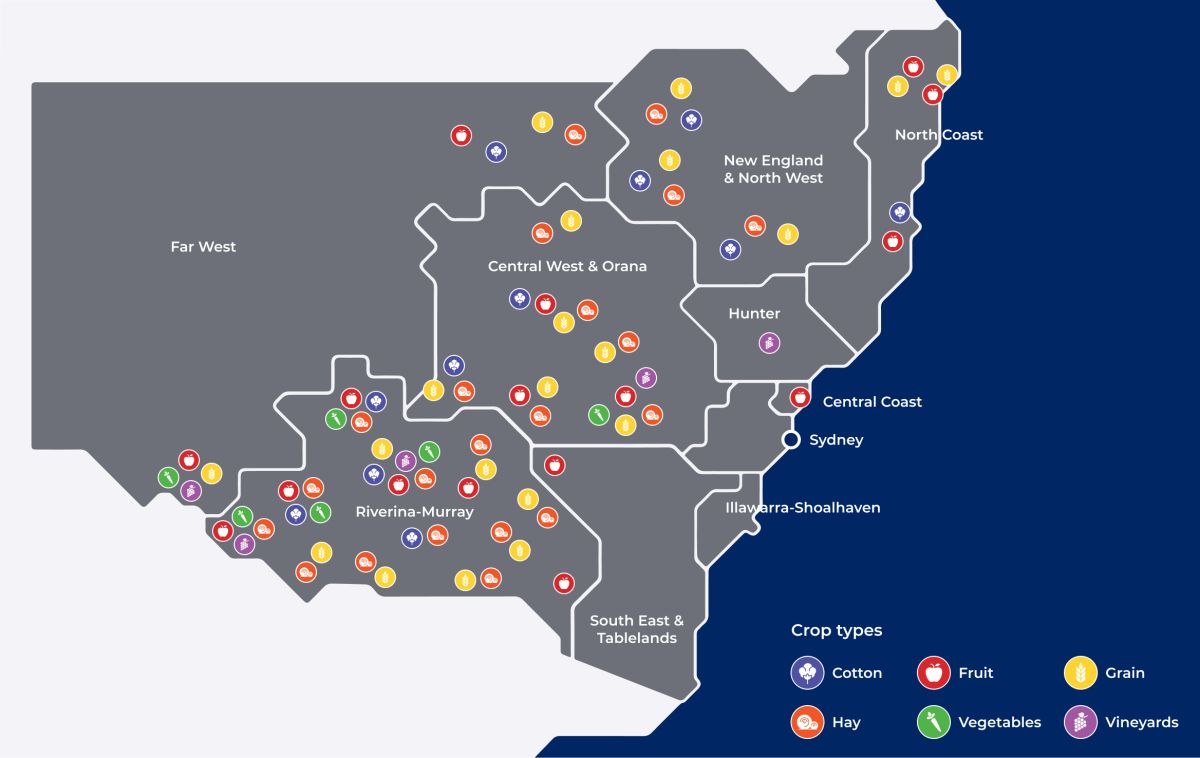Information and advice for seasonal workers
Tips and information to help you find seasonal work.
About seasonal work
The agriculture industry is facing a significant labour shortage as a result of COVID-19.
If you are looking for employment opportunities, now is a great time to consider agriculture and farm work. Learning how food is produced and harvested is an exciting regional experience.
The agriculture industry has a range of jobs on offer including fruit picking, grain harvesting and working on cattle stations.
NSW Agricultural Regions
Regional NSW enjoys a diverse climate and geography which produces a wide range of crops such as nuts, berries, other horticulture, grains, cotton, oilseeds and pulses.
Click on the map to see what crops are produced in each region of NSW.

What seasonal work involves
Physically demanding work
Seasonal work can be physically demanding. Employers may look for commitment, physical strength and stamina.
Harvesting can involve heavy lifting, frequent bending, climbing ladders and working at height or operating heavy machinery. Packing produce may be less physical but is generally more repetitive.
Unskilled work
Some roles are suitable for unskilled workers.
Before applying for a job, check if you have the personal attributes in the advertisement.
Skilled work
Some roles require particular skills and experience.
Before applying for a job, check if you have the qualifications, skills and attributes in the advertisement.
Eligibility for seasonal work
You can do seasonal work if you are already in Australia and you:
- are an Australian citizen or permanent resident
- are an eligible working holiday maker holding a visa with appropriate working rights
- are an overseas student with working rights in Australia
- hold a Seasonal Worker Program visa
- hold a temporary work visa with general work rights, not restricted to an employer or type of work.
Tips for seasonal workers
A lot of seasonal work is in regional or remote NSW.
Before travelling to regional or remote NSW, you should:
- obtain employment before travelling to regional or rural NSW
- check out nearby accommodation options and costs
- make sure there are facilities and services available.
Before accepting or starting a seasonal job, you should:
- check advice on travel in NSW
- check out NSW COVID-19 support and guidence
- stay up-to-date with the latest advice and know what you can and can't do in NSW.
Before travelling to start seasonal work, ask your employer what to bring, and what will be available. Utilise the 'Find Information For You' search box on Safe Work Australia, consider:
- personal protective equipment
- hat
- sunglasses
- sturdy, closed-in shoes
- sunscreen
- food
- water
- personal products, including toiletries or medication.
Heatstroke is linked to dehydration.
Symptoms of heat exhaustion include dizziness, fainting, fatigue, nausea or vomiting.
To prevent heatstroke drink plenty of water, particularly when doing physical work. Also wear a hat and lightweight, loose-fitting, cotton clothing. If affected, rest in the shade and rehydrate with water.
Severe heatstroke can lead to disorientation, hallucinations and seizures. Seek medical assistance immediately if exhibiting these symptoms.
Learn more about heatstroke.
The sun in NSW is very strong and your skin may burn even on cloudy days.
To protect yourself from the sun:
-
slip on some clothing
-
slop on broad-spectrum, water-resistant SPF30+ sunscreen
-
slap on a broad-brimmed hat to protect your face, head, neck and ears
-
slide on some sunglasses, making sure they meet Australian Standards
-
seek shade, where possible.
Learn more about sunburn and sun protection.
Upskill by completing a short course
Not all seasonal jobs require training or qualifications. However, completing a short course may help you secure seasonal work in the agriculture industry.
Before applying for a job, check if you have the skills and personal attributes in the advertisement.
Courses to consider include:
- auto electrics
- book keeping
- business management
- chainsaw operations
- confined spaces
- dogging
- drone operations
- elevated work platform
- excavator tickets
- farm management
- grain harvest operations
- forklift tickets
- heavy vehicle
- operate quad bikes
- operate side-by-side utility vehicles
- operate tractors
- small engine maintenance
- work health and safety.
Vocational and tertiary qualifications
Not all seasonal jobs require training or qualifications. However, obtaining vocational or tertiary qualifications may help you secure seasonal work in the agriculture industry.
Before applying for a job, check if you have the qualifications, skills and personal attributes in the advertisement.
Visit the Smart and Skilled website to find relevant courses and check your eligibility for government-subsidised training.
Below are some vocational and tertiary courses that you may wish to consider.
Qualifications in agriculture can lead to a job as a meat or dairy producer, a feedlot operations manager, a shearer or wool classer, an agribusiness manager or an organic farmer.
The College is part of the Tocal Agricultural Centre, which provides nationally recognised qualifications, online courses and short courses.
RuralBiz provides quality, self-paced learning for the rural and agribusiness industry.
The Bachelor of Agriculture from Charles Sturt University will provide you with education across all major disciplines that underpin modern agricultural industries.
Australia's future resource security relies on smart science and smart technology to sustain our food and fibre production resources. This degree produces graduates with skills in increasing demand in the rural sector.